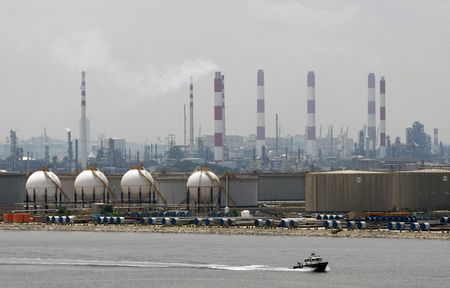By Stefanno Sulaiman and Gayatri Suroyo
JAKARTA (Reuters) -Indonesia’s economy grew 5.03% in 2024, roughly similar to the previous year’s rate and in line with expectations, but the pace was the slowest in three years, official data showed on Wednesday.
Growth in Southeast Asia’s largest economy has hovered around 5% since the COVID-19 pandemic, a solid pace but far behind new President Prabowo Subianto’s 8% target. In 2023, growth was 5.05%.
Last year, economic growth was propped up by spending for political campaigns and elections as well as rising investment, which offset shrinking net exports. Investment growth in 2024, at 4.61% year-on-year, was the highest in six years.
The outgoing government’s decision to accelerate infrastructure projects also contributed to growth, finishing construction of toll roads and dams before Prabowo took office in October, Statistics Indonesia data showed.
The growth outlook this year is clouded by the prospect of U.S. tariffs disrupting trade and weakening global demand, the central bank said last month when it downgraded its 2025 growth forecast to a range of 4.7%-5.5% from 4.8%-5.6%.
Bank Indonesia has cut interest rates twice since September, by a total of 50 basis points, to try to stimulate the economy.
Prabowo’s administration has also launched programmes the government believes would boost growth, including providing electricity tariff discounts to bolster purchasing power, free meals for school children, and building affordable housing.
In the fourth quarter, GDP grew 5.02% annually, close to the 4.98% median forecast of analysts polled by Reuters and little changed from the 4.95% pace in the third quarter.
Household consumption, which makes up over half of GDP, grew 4.98% on-year amid holiday spending, up a touch from a 4.91% growth in the previous quarter.
Investment expanded 5.03% on-year in the October-December quarter, compared with 5.15% growth in the previous three months.
On a non-seasonally adjusted basis, GDP rose 0.53% in the fourth quarter from July-September.
(Reporting by Gayatri Suroyo, Stefanno Sulaiman and Fransiska Nangoy; Editing by John Mair and Kim Coghill)











